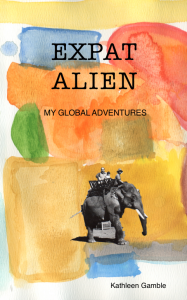Expat Alien: My Global Adventures: Chapter 5
By the time Kathleen was 18 she had lived on five continents. When she starts college in California, she experiences severe “reverse” culture shock. She talks about traveling around Europe, seeing the sites from London to Athens, hiking up Swiss mountains, and living in Africa. She survived a plane crash, a coup d’etat in Burma, earthquakes in Mexico, driving through the Andes in Columbia and army ants in Nigeria. Her college peers talk about football games, high school proms and television shows she never heard of. She can’t relate to them at all and they think she is bragging about all the places she has been. It is like an alien landed in their dorm room talking about visiting the rings of Saturn. Follow Kathleen on her journey through the ups and downs of being a Third Culture Kid. Read the previous chapters here.
 For the next few weeks we will publish a few chapters of her book. We encourage you to purchase the entire book. You can get the paperback or digital format for Kindle, or the Nook from Amazon. and Barnes and Noble.
For the next few weeks we will publish a few chapters of her book. We encourage you to purchase the entire book. You can get the paperback or digital format for Kindle, or the Nook from Amazon. and Barnes and Noble.
- Paperback edition sells for $15.95
- Kindle/Nook editions sell for $9.95
State Agricultural Institute, Pyinmana
My father was always curious about the school he started in Burma and wanted to know if it survived given the difficult times Burma was experiencing. In 1971 he was able to get a visa and go for a visit. He arrived almost 19 years to the day from his first arrival in Burma.
He had written to a few people of his visit and U Thein Han, former Ford Foundation General Services officer and Ko Paul Sa from Pyinmana were at the airport to meet him.
Not much had changed in Burma since he had left. The only difference he noted was that the train to Pyinmana ran on time and live chickens were no longer allowed in the compartment. The countryside and villages looked the same.
He remembers:
“The countryside looked the same as years ago. This was the only place I had ever been where I had the feeling that nothing had changed (expect the trains ran on time). The people dressed exactly as before, and even foreign educated Burmese still wore the same traditional dress as the villagers who had never left home. The villages were the same with their raised bamboo houses and thatched roofs surrounded by lush green plants to hide the dirt and garbage. Round-faced smiling children still ran down to see the trains go by while oxcart drivers patiently and passively waited at the crossings with their loads of rice, sugarcane or timber.
About 15 staff members from the Institute met me at the station in Pyinmana. We climbed into the old red and green station wagons and it seemed for a moment as if I had never been away.
When the Institute started, there were 4 Burmese professional staff members and me. Later, the foreign advisory group expanded to 5, none of whom remained less than 5 years. Now the staff numbered 24, and 20 of these were former students of mine, most of who had gone abroad after finishing at Pyinmana to obtain their degrees either in the Philippines or the United States. Over 800 students had graduated from the Institute and the student body included a number of women.”
As of 2004, the Institute had evolved into a full 4-year college of agriculture and had over 2,000 graduates.

Kathleen Gamble was born and raised overseas and has traveled extensively. She has a BA in Spanish and has worked in publishing, printing, desktop publishing, translating, and purchasing. She also designs and creates her own needlepoint. She started journaling at a young age and her memoir, Expat Alien, came out of those early journals. Over the years she has edited and produced an American Women’s Organization cookbook in Moscow, Russia, and several newsletters. Her first book, Expat Alien, was published in 2012 and she recently published a cookbook, 52 Food Fridays, both available on Amazon.com. You can also follow her blog at ExpatAlien.com.
